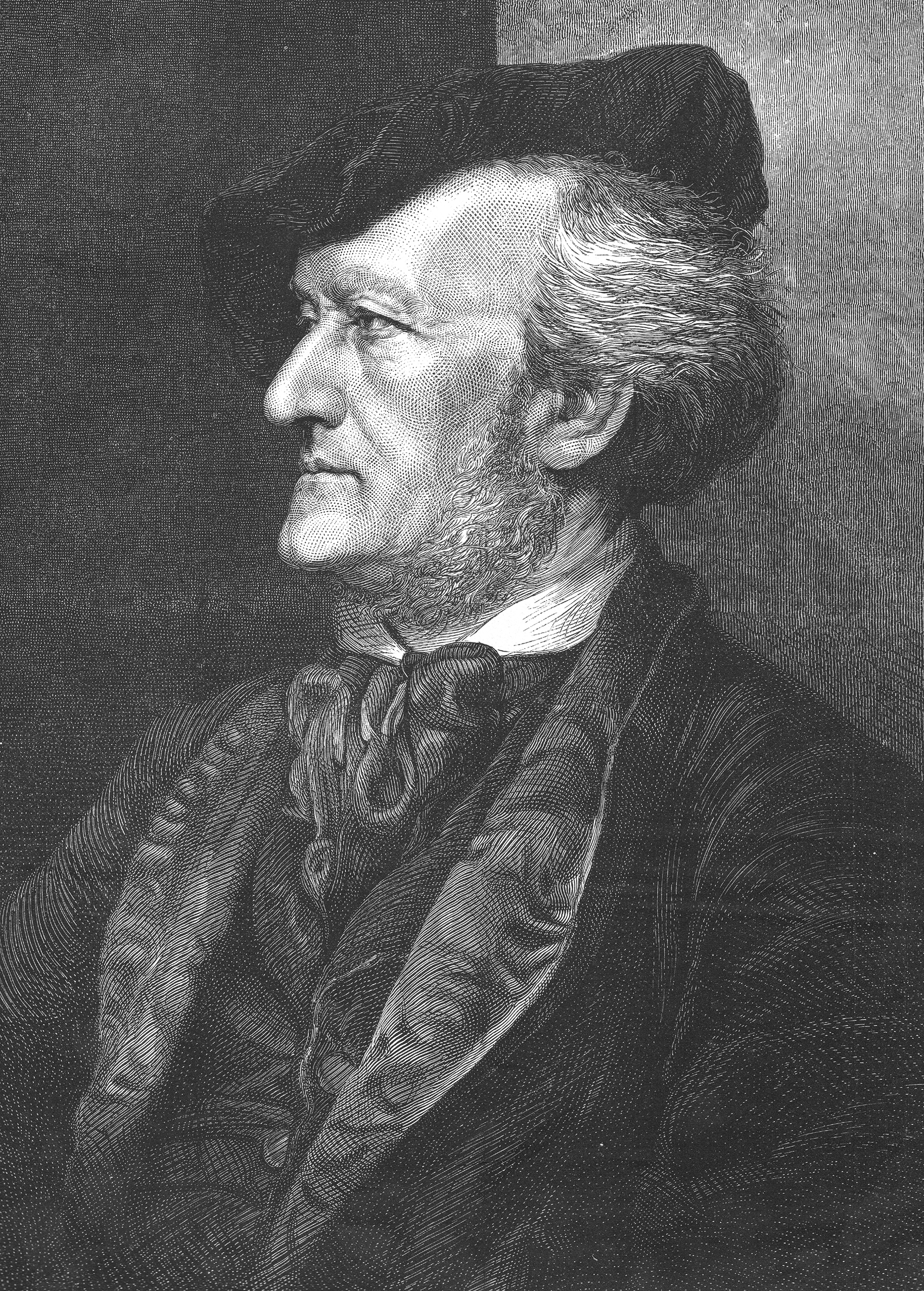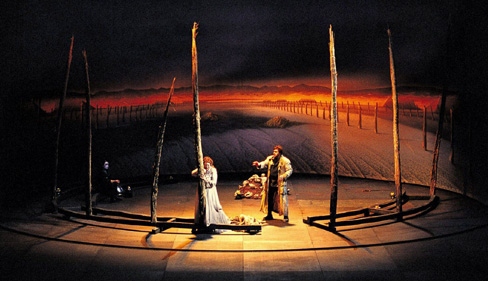Wagner << VAHG nuhr >>, Richard (1813-1883), was a great German composer who fundamentally changed European musical, literary, and theatrical life. Wagner believed that the theater should be the center of a community’s culture rather than merely a place of entertainment. He finally built his own theater and founded Europe’s oldest summer music festival. He intended this festival and the ideal conditions it offered to performing artists to serve as a model for other theaters.

Wagner wrote his own opera librettos (texts), basing his mature works on episodes from history and from medieval myths and legends. In the music of his earlier works, he used elements of the German, French, and Italian operatic styles of his time. He reached a climax in Lohengrin, which brought these diverse elements to intense, expressive unity. After Lohengrin, Wagner developed a new musical language. Composers like Mozart tended to compose operas that were divided into a series of separate musical pieces or “numbers.” Wagner moved to a freer chain of many melodic ideas (called motives) and keys, using new ways to blend them into the vast dimensions of his musical dramas.
Loading the player...Lohengrin
Early career.
Wagner was born in Leipzig on May 22, 1813. Early in life, he showed a flair for the theater and might have become a great actor if he had not decided to become a musician. From 1833 to 1839, he was an opera conductor in German cities. He wrote his first complete opera, The Fairies (1834), in the German romantic style. He abandoned this style in his next opera, The Ban on Love (1835), based on Shakespeare’s Measure for Measure. In 1836, he married Minna Planer, an actress. It was a stormy marriage and they lived apart in the last years before her death in 1866.
Wagner’s next project was Rienzi, an opera in the imposing style called French grand opera. He interrupted his work on Rienzi after hearing a performance of Beethoven‘s ninth symphony in Paris in 1839. This renewed his faith in German music and inspired his first masterpiece, A Faust Overture for orchestra (1840). Wagner no longer had complete faith in Rienzi. But he completed it anyway, because a successful production in Paris would ensure his reputation as an opera composer all over Europe. The opera was not produced, however, and Wagner ran out of money. In 1841, he finished The Flying Dutchman, returning to the German romantic style. It was first performed in 1843.
Loading the player...The Flying Dutchman
His fortunes revived in 1842 with an offer to conduct Rienzi at the Dresden opera house. In Dresden, Wagner composed Tannhäuser (1845) and Lohengrin (1848), two great treatments of the romantic view of medieval chivalry.
Meanwhile, social revolution brewed in Germany. Wagner was convinced that musicians were treated unjustly and that the organization and operation of the theaters were poor. His resentment led to his participation in an unsuccessful revolution in 1849. A warrant was issued for his arrest and he fled to Switzerland. He was not allowed to return to Germany for 12 years.
Later career.
During his first years in Switzerland, Wagner wrote no music. Instead, he examined his own philosophy of art and life and wrote on social, religious, and artistic problems. He also began to expand the libretto for his greatest creation, The Ring of the Nibelung. He began work on the music for this cycle of four operas in 1853. He finished The Rhine Gold (Das Rheingold) in 1854, The Valkyrie (Die Walkure) in 1856, and the first two acts of Siegfried by 1857. Then he composed another work he had been planning, Tristan and Isolde. He did not compose the third act of Siegfried until 1869.

The Ring of the Nibelung: The Valkyrie
Tristan, completed by 1859, is a landmark in music because of the intensely chromatic style which reflects the ambiguity in the relationship between Tristan and Isolde. This style greatly increased the expressive nature of Wagner’s melodies and harmonies. Tristan is a unique conception for the stage. It deals less with external events or actions than with the powerful emotional lives of the characters, what Wagner called an “interior drama.”
Loading the player...Liebestod from Tristan and Isolde
Getting Tristan produced was Wagner’s chief concern after 1859. Tannhäuser, in a revised version, was performed unsuccessfully in Paris in 1861. Debts piled up, and he constantly faced financial ruin. In 1864, King Ludwig II of Bavaria came to his rescue. Wagner became the king’s adviser in Munich, and Tristan was produced there in 1865. Meanwhile, Wagner had started work on his only mature comedy, The Mastersingers of Nuremberg (Die Meistersinger von Nurnberg). He finished it in Switzerland in 1867. In 1874, he concluded the entire Ring cycle with the completion of The Twilight of the Gods (Die Gotterdammerung). About 1864, Wagner fell in love with Cosima von Bulow, the married daughter of composer Franz Liszt. Cosima became his mistress, and they were married in 1870.
Loading the player...The Ring of the Nibelung: The Twilight of the Gods
Wagner’s music made a great impression on King Ludwig’s romantic imagination. The composer used the king’s admiration for his work to further his own ambitions. With the king’s aid, Wagner built a theater in Bayreuth in which to perform the Ring. The first festival was held there in 1876. He composed his last work, the opera Parsifal (1882), to be performed in this theater. Wagner died on Feb. 13, 1883.
Wagner’s philosophy.
Wagner tried to find a new way of combining music and drama in the theater. He believed the basic error in opera was that music had become the sole end. Drama served merely as an excuse for musical display. Wagner aimed at a work in which all the various elements in operatic composition were in perfect harmony and directed toward a single artistic end.
Wagner considered the orchestra the greatest artistic achievement of his time, and wanted to take greater advantage of its expressive possibilities. Wagner did not think the orchestra should accompany a vocal line with repeated chords like a “monstrous guitar.” He believed it could be given a more elaborate musical texture in which the vocal line would be one independent strand. His use of recurrent motives permitted continuous music throughout an act, with no breaks until the end. Wagner disliked “operatic” acting, and insisted that singers use only movements required by the music.
In addition to his opera texts, Wagner wrote criticism, polemics (literary arguments), and theoretical works. His most important writings outline and defend the principles of his mature music dramas. Wagner wrote passionately on many scientific, political, and religious topics. Wagner’s arguments, however, were sometimes illogical and cruel. For example, his dislike of the German-Jewish composer Giacomo Meyerbeer led Wagner to write an attack on Judaism in music. Wagner had conflicting feelings about Jews, and many people have considered him anti-Semitic. Despite his controversial personal life, Wagner’s works have placed him in the ranks of the world’s greatest composers.
